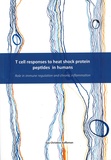T cell responses to heat shock protein peptides in humans
role in immune regulation and chronic inflammation
Summary
Heat shock proteins (HSP) are highly conserved proteins with various identities and intracellular functions. Most HSP are cell stress proteins, meaning that their intracellular transcription is up regulated upon noxious stimuli such as heat, hypoxia and inflammation. As intracellular chaperones they protect other intracellular proteins from denaturation under these circumstances. When cells are damaged, HSP are also found in the extracellular fluid, due to secretion and leakage from cells. Interestingly, HSP are important antigens for the immune system, capable of inducing both innate and adaptive immune responses. Although HSP were originally categorized as danger signals for the immune system, evidence on regulatory effects of class II presentation of HSP-peptides on T cells has accumulated. The experimental work presented in this thesis is aimed at studying T cell responses to peptides of HSP in the human immune system, with focus on autoimmune diseases. Three HSP families are discussed in this thesis: dnaJ (HSP40), HSP60 and HSP70. DnaJ. We present the first phase II clinical trial on mucosal tolerance induction with the HSP-peptide dnaJp1 in RA. Daily oral administration of peptide dnaJp1 resulted in a decrease in disease activity, without major side effects. We found a change in T cell responses to the peptide after 168 days of therapy with a significant decrease in TNFα production of CD4+ T cells and a non-significant increase in IL10. A higher gene expression of immune tolerance molecules in PBMC after incubation with dnaJp1 before initiation of the trial correlated with a better clinical response. HSP60. We found that CD4+ T cells from synovial fluid of Rheumatoid Arthritis (RA) patients respond to the self-HSP60-peptide p2. Interestingly, these responses were only apparent when CD4+CD25+ T cells were depleted from the culture. When CD4+CD25- synovial T cells were cultured with peptide p2, CD25 was up regulated on the cell surface and the resulting CD25high cells were functionally suppressive in vitro, suggesting an immune regulating effect. HSP70. We performed a literature search for HSP70-peptides eluted from HLA on human APC. We detected proliferation and cytokine production by healthy donor CD4+ T cells towards a selection of these naturally presented HSP70 peptides. This demonstrated that HSP70-specific T cells are present in the peripheral blood of healthy donors. We then turned to a tissue where HSP70 has a well-defined crucial function in the protection of its cells: the muscle. We showed that the presence of extracellular HSP70 is increased in the muscle of patients with the inflammatory myopathy Juvenile Dermatomyositis (JDM). We found that one of the selected HSP70 peptides (H443) induced TNFα, IFNγ and IL17 production by peripheral blood T cells from JDM patients.
